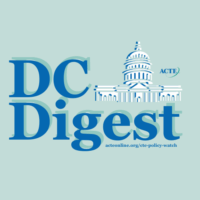 Market Value of Nondegree Credentials: A report from the Brookings Institution examines the wage premiums workers gain from attaining specific nondegree credentials, such as digital badges and industry certifications.
Market Value of Nondegree Credentials: A report from the Brookings Institution examines the wage premiums workers gain from attaining specific nondegree credentials, such as digital badges and industry certifications.
After analyzing the resumes and wages of over 37 million U.S. workers, the researchers found that, on average, a worker’s first job-relevant nondegree credential yields them 3.8% higher wages compared to similar workers without a credential—double the 1.8% premium from a job-irrelevant credential. Analyzing by type of nondegree credential, a worker’s first job-relevant microcredential yields the highest wage premium (4.5%), followed by job-relevant industry certifications (4.1%). Premiums associated with digital badges and academic certificates are smaller and do not rely on job relevance.
Non-college and early career workers realize particularly high wage premiums for their first relevant nondegree credential (6.8% and 6.1%, respectively), indicating that these credentials offer strong occupational pathways to high-wage careers for workers who are not college educated or have limited work experience.
Administrator Perspectives on CTE Staffing Challenges: A paper from the Georgia Policy Labs examines how CTE administrators perceive and tackle CTE teacher shortages in their districts and schools. The researchers surveyed and interviewed CTE administrators from Massachusetts and Washington, interviewed each state’s CTE director and identified six overarching themes:
- The Nature of Hiring Challenges: CTE teacher vacancies differed across Massachusetts and Washington by Career Cluster, but administrators in both states identify teacher attrition as the main reason why positions go unfilled. Furthermore, administrators in both states acknowledge the difficulty in finding candidates that meet licensure and experience needs while also competing with industry salaries.
- Staffing Strategies: When a vacancy occurs, administrators from both states indicate that they usually place a teacher who lacks CTE experience into the course. If the vacancy is immediate and no external help is available, existing teachers may absorb the workload instead, a practice especially common in Washington.
- Impacts of Challenges and Strategies: Vacancies and a lack of qualified applicants result in administrators either relying on substitutes or shuttering a course, restricting access. The costs of constantly hiring and training teachers also strains districts.
- District Flexibilities: Administrators have very little leeway when recruiting or retaining CTE teachers but have adapted various go-to strategies. These include placing teachers with industry experience higher on salary schedules, covering costs for certification and developing “grow-your-own” programs.
- Hiring Preferences: Administrators were presented five random pairs of hypothetical CTE teacher profiles and asked to identify ones they preferred. Respondents in both states most valued prior relevant industry experience and least valued full teacher certification.
- Policy Recommendations: Nearly half of the administrators in both states indicated that greater flexibility in licensure rules would help the most with CTE teacher hiring, such as allowing CTE teachers to substitute teacher certification exams with industry credentials.
Exploring the Costs of CTE-dedicated High Schools in New York City: A report from the Research Alliance for New York City Schools analyzes and compares the per pupil costs and return on investment for students enrolled in CTE-dedicated high schools to other types of high schools in the New York City Public Schools system.
The researchers specifically examined students who entered high school between 2013-16 and found that CTE-dedicated high schools spent about 5% more per pupil compared to other types of high schools. The majority of this difference is spending for teacher salaries, as CTE-dedicated high schools have significantly smaller student-teacher ratios.
Despite these additional costs, CTE-dedicated high schools showcase a return on investment in both high school graduation and college-going rates. Particularly, newer schools aligned with college degree pathways were the least costly and the most effective at producing graduates and college enrollees. Mixed-aligned schools—where students pursue careers that may require some postsecondary education but not necessarily a bachelor’s degree—also have a positive return on investment with respect to graduation. Workforce-aligned schools experience no positive return on investment for either high school graduation or college enrollment, but the authors note students in these schools often aim to enter the workforce directly after high school.
A Post-pandemic Analysis of CTE Performance by Gender: A journal article by Ericca S. Douglas and John R. Slate in the American Journal of STEM Education examines CTE participation and completion rates by gender in Texas from 2020-23.
The researchers found that, across all three school years, girls had significantly higher CTE concentration and completion rates while boys participated in a wider variety of clusters. Unsurprisingly, boys dominated enrollment in clusters aligned with traditionally male fields, such as Manufacturing, while girls were concentrated in clusters like Health Science and Education and Training. Completion rates varied by cluster as well, with girls generally having higher completion rates across clusters compared to boys. Girls and boys had similar concentration and completion rates for some clusters, such as Agriculture and Law and Public Services.


 All focus was on the appropriations process in DC this week, as Congress attempted to navigate the passage of the remaining six appropriations bills before the expiration of the current continuing resolution (CR) on Jan. 30. Senate leaders struck a deal on Thursday to separate homeland security funding from a package of other funding bills, which includes FY 26 funding for the Education (ED) and Labor Departments (DOL). On Friday, the Senate passed a new short-term CR that would fund homeland security activities at their current level until Feb. 13, while approving the remaining five appropriations bills as originally
All focus was on the appropriations process in DC this week, as Congress attempted to navigate the passage of the remaining six appropriations bills before the expiration of the current continuing resolution (CR) on Jan. 30. Senate leaders struck a deal on Thursday to separate homeland security funding from a package of other funding bills, which includes FY 26 funding for the Education (ED) and Labor Departments (DOL). On Friday, the Senate passed a new short-term CR that would fund homeland security activities at their current level until Feb. 13, while approving the remaining five appropriations bills as originally  Market Value of Nondegree Credentials:
Market Value of Nondegree Credentials:




